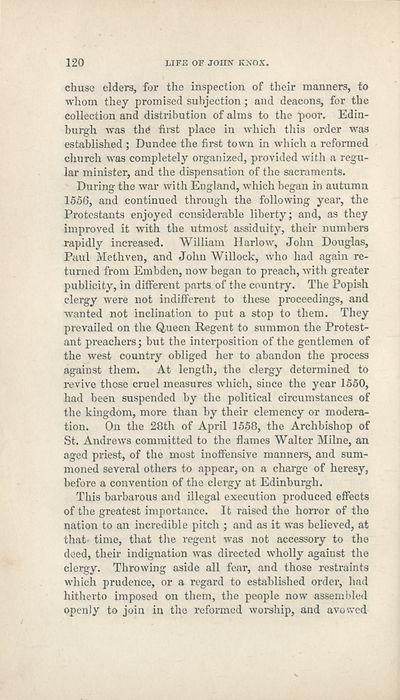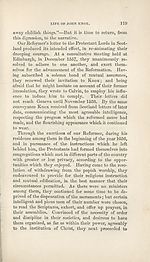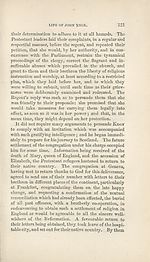Download files
Complete book:
Individual page:
Thumbnail gallery: Grid view | List view

120
LIFE OF JOHN KNOX.
chuse elders, for the inspection of their manners, to
whom they promised subjection ; and deacons, for the
collection and distribution of alms to the 'poor. Edin¬
burgh was the first place in which this order was
established ; Dundee the first town in which a reformed
church was completely organized, provided with a regu¬
lar minister, and the dispensation of the sacraments.
During the war with England, which began in autumn
1556, and continued through the following year, the
Protestants enjoyed considerable liberty; and, as they
improved it with the utmost assiduity, their numbers
rapidly increased. William Harlow, John Douglas,
Paul Methven, and John Willock, who had again re¬
turned from Embden, now began to preach, with greater
publicity, in different parts of the country. The Popish
clergy were not indifferent to these proceedings, and
wanted not inclination to put a stop to them. They
prevailed on the Queen Regent to summon the Protest¬
ant preachers; but the interposition of the gentlemen of
the west country obliged her to abandon the process
against them. At length, the clergy determined to
revive those cruel measures which, since the year 1550,
had been suspended by the political circumstances of
the kingdom, more than by their clemency or modera¬
tion. On the 28th of April 1558, the Archbishop of
St. Andrews committed to the flames Walter Milne, an
aged priest, of the most inoffensive manners, and sum¬
moned several others to appear, on a charge of heresy,
before a convention of the clergy at Edinburgh.
This barbarous and illegal execution produced effects
of the greatest importance. It raised the horror of the
nation to an incredible pitch ; and as it was believed, at
that- time, that the regent was not accessory to the
deed, their indignation was directed wholly against the
clergy. Throwing aside all fear, and those restraints
which prudence, or a regard to established order, had
hitherto imposed on them, the people now assembled
openly to join in the reformed worship, and avowed
LIFE OF JOHN KNOX.
chuse elders, for the inspection of their manners, to
whom they promised subjection ; and deacons, for the
collection and distribution of alms to the 'poor. Edin¬
burgh was the first place in which this order was
established ; Dundee the first town in which a reformed
church was completely organized, provided with a regu¬
lar minister, and the dispensation of the sacraments.
During the war with England, which began in autumn
1556, and continued through the following year, the
Protestants enjoyed considerable liberty; and, as they
improved it with the utmost assiduity, their numbers
rapidly increased. William Harlow, John Douglas,
Paul Methven, and John Willock, who had again re¬
turned from Embden, now began to preach, with greater
publicity, in different parts of the country. The Popish
clergy were not indifferent to these proceedings, and
wanted not inclination to put a stop to them. They
prevailed on the Queen Regent to summon the Protest¬
ant preachers; but the interposition of the gentlemen of
the west country obliged her to abandon the process
against them. At length, the clergy determined to
revive those cruel measures which, since the year 1550,
had been suspended by the political circumstances of
the kingdom, more than by their clemency or modera¬
tion. On the 28th of April 1558, the Archbishop of
St. Andrews committed to the flames Walter Milne, an
aged priest, of the most inoffensive manners, and sum¬
moned several others to appear, on a charge of heresy,
before a convention of the clergy at Edinburgh.
This barbarous and illegal execution produced effects
of the greatest importance. It raised the horror of the
nation to an incredible pitch ; and as it was believed, at
that- time, that the regent was not accessory to the
deed, their indignation was directed wholly against the
clergy. Throwing aside all fear, and those restraints
which prudence, or a regard to established order, had
hitherto imposed on them, the people now assembled
openly to join in the reformed worship, and avowed
Set display mode to:
![]() Universal Viewer |
Universal Viewer | ![]() Mirador |
Large image | Transcription
Mirador |
Large image | Transcription
| Antiquarian books of Scotland > Scotland/Scots > Life of John Knox ; and, The life of Alexander Henderson > (138) |
|---|
| Permanent URL | https://digital.nls.uk/131833960 |
|---|
| Description | Thousands of printed books from the Antiquarian Books of Scotland collection which dates from 1641 to the 1980s. The collection consists of 14,800 books which were published in Scotland or have a Scottish connection, e.g. through the author, printer or owner. Subjects covered include sport, education, diseases, adventure, occupations, Jacobites, politics and religion. Among the 29 languages represented are English, Gaelic, Italian, French, Russian and Swedish. |
|---|

